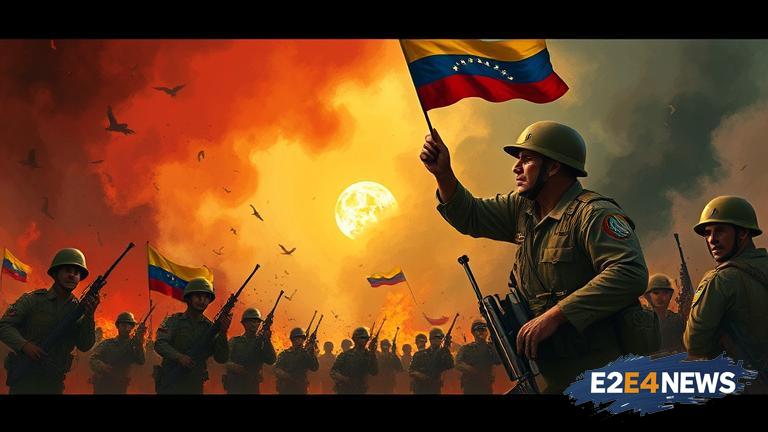Venezuela, a country plagued by economic crisis, corruption, and violence, has taken a drastic turn with the implementation of a gun ban. The ban, which was introduced in an attempt to reduce crime, has had the opposite effect, with violent crime rates soaring. The Venezuelan government, led by President Nicolas Maduro, has now announced plans to build an anti-US militia, sparking concerns about the country’s stability and future. The militia, which will be made up of civilians, will be trained to defend the country against perceived threats from the US. This move has been met with criticism from opposition leaders, who claim that it is a desperate attempt by Maduro to cling to power. The gun ban, which was introduced in 2012, has been widely criticized for its ineffectiveness in reducing crime. In fact, the ban has led to a surge in violent crime, with many Venezuelans feeling helpless and vulnerable. The lack of access to firearms has also made it difficult for citizens to defend themselves against armed gangs and robbers. The situation has become so dire that many Venezuelans have been forced to flee the country in search of safety and security. The anti-US militia plans have also sparked concerns about the country’s relationship with the US. The US has been a long-time critic of Maduro’s government, and the creation of an anti-US militia is likely to further strain relations between the two countries. The Venezuelan government has accused the US of interfering in its internal affairs and has claimed that the US is behind the country’s economic woes. However, the US has denied these claims, and has instead offered to provide humanitarian aid to the struggling country. Despite the offer, Maduro has refused to accept aid from the US, citing concerns about the country’s sovereignty. The situation in Venezuela continues to deteriorate, with many experts predicting that the country is on the brink of collapse. The economic crisis has led to widespread poverty, and the lack of access to basic necessities such as food and medicine has become a major concern. The Venezuelan government has been accused of corruption and mismanagement, and many citizens have lost faith in the government’s ability to provide for their needs. The creation of an anti-US militia is likely to further polarize the country, with many citizens opposing the move. The opposition has called for peaceful protests and demonstrations, but the government has responded with force, leading to clashes between protesters and security forces. The international community has condemned the violence and has called for calm and restraint. The situation in Venezuela is complex and multifaceted, and it is unclear what the future holds for the country. However, one thing is certain: the Venezuelan people deserve better than the chaos and instability that they are currently facing. The international community must come together to provide support and assistance to the Venezuelan people, and to help the country find a path towards peace and stability. The US, in particular, has a role to play in helping to resolve the crisis, and must work with other countries to provide humanitarian aid and support. The Venezuelan government must also take responsibility for its actions and work towards finding a solution to the crisis. The creation of an anti-US militia is not the answer, and the government must focus on addressing the root causes of the crisis, rather than blaming external factors. The future of Venezuela hangs in the balance, and it is up to the international community to help the country find a way forward.
